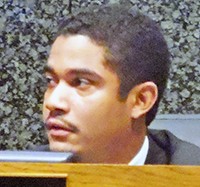With the apparent reaching of a compromise on Monday between feuding factions of the Shelby County Commission, a lawsuit may have been resolved and a modus vivendi of sorts achieved, but the ideologically polarized body still has issues.
It took a while, both in the long run (two and a half months since the standoff began, in the immediate wake of the August 7th election) and in the short term (two hours of mind-bending intricacy at Monday’s climactic public meeting), but the commission’s simmering power struggle finally ended — or seemed to — with a win-win solution.
Both of the warring party-line-plus-one factions were claiming victory, in any case — the one composed of six Democrats and one Republican (Steve Basar), and the one containing five Republicans and one Democrat (Justin Ford).
The solution involved a willingness by the D-Plus-Ones to give up their ongoing Chancery Court lawsuit against Chairman Ford (for his seemingly high-handed control of what could be placed on the commission agenda) in return for the R-Plus-Ones’ agreement to drop their appeal of an adverse decision by Chancellor Jim Kyle, coupled with Ford’s acceptance of majority rule in determining agenda items.
Ford and his Republican allies claimed victory because they had fended off what Republicans Heidi Shafer and Terry Roland saw as an effort by the D-Plus-Ones to “overthrow” Ford’s chairmanship. The Democratic coalition — whose ad hoc leaders were newbie Van Turner and the veteran Walter Bailey — claimed victory because they had forced Ford to yield on his arbitrary control of the agenda.
Virtually lost sight of in the two-sided celebration (which followed an exhausting and repetitious squabble settled evidently in an off-to-the-side chat by competing lawyers Turner and Ron Krelstein) was the origin of the dispute, in the chairmanship election held on September 8th by a freshly elected commission with six new members.
Basar, who had been vice chair in 2013-14, had expected to be elected chairman and was shocked when the majority of Republicans opted instead for the candidacy of Roland, then switched to Democrat Ford when the Millington Republican seemed obviously about to fall short.
Ford was ultimately elected on the basis of his own vote and that of the commission’s six Republicans (including the stunned Basar, who would shortly have a change of mind). Bailey, the commission’s senior Democrat, was meanwhile outraged by his second-place finish to Ford, whose long-term chumminess with Republicans and openness to their agenda were no secret.
At the commission’s next meeting, on September 22nd, Bailey and five other Democrats, along with Basar, voted together to block the committee appointments made by Ford. Weeks later, Ford would get his way on the committee matter, but in the meantime, the battle had shifted to the matter of an agenda item that Basar kept proposing and Ford kept rejecting.
That agenda item, which proposed a rules change allowing agenda items to be added on the basis of simple majority votes and not by a two-thirds super-majority, became the basis of a Democratic coalition lawsuit against Ford’s alleged violations of commission rules via his persistent rejections.
Two weeks ago Chancellor Kyle declined to rule outright on the suit, finding instead that the commission had no rules because it had adopted none for the new body and directing commissioners to adopt new rules or to readopt the body’s former rules.
Hence a motion for an amended rules package presented as an add-on by Basar on Monday, igniting another round of the ongoing factional dispute — partly tedious, partly fascinating — and going over all of the same old issues dividing the body.
The amended rules package contained new clauses calling for the majority-rule principle and essentially removing the chairman from any control over agenda items. Deleted from the package, on a finding by County Attorney Marcy Ingram that it conflicted with the county charter, was a clause declaring that the chairman served “at the will and pleasure of the commission.”
When the deal finally came sometime after 6 p.m. on Monday, the two sides had agreed (on a motion by Ford!) to defer the rules matter to the next meeting of the general government committee, to drop their respective legal actions, and to do the trade-off indicated above: Ford can feel secure in his chairmanship, though he has had to sacrifice the power over the agenda that he had previously claimed and employed.
Either both sides won or both sides lost. The question now becomes: Do the two party-line-plus-one coalitions continue to cohere, or do they break apart, a major part of their raison-d’être having dissolved.
• An indicator of whether the coalitions might hold was implicit in another vote taken by the commission on Monday. Two votes, actually, on related ordinances proposed by Roland — to strike language in existing ordinances requiring that contractors with the county observe living wage and prevailing wage standards, respectively.
Roland’s premise is that the existing ordinances are inconsistent with legislation passed by the Republican dominated General Assembly establishing state standards in such matters and prohibiting local requirements that might clash with them. The issue, both in Shelby County and in Nashville, has been a clear divider between Democrats and Republicans.
Since this was the second reading for both Roland ordinances, and since the commission was girding for the later clash on the rules matter, it was tacitly agreed that there would be no extended debate and that any knock-down, drag-out clash between factions would be postponed until the crucial third reading of the ordinances, at the commission’s next full public session.
Both the Roland ordinances got a tentative okay by the margin of 7-6, with Basar voting along with other Republicans and Democrat Ford voting with them as well.
On that evidence of Ford’s continued solidarity with his Republican supporters, coupled with Basar’s reversion to ideological form on a power-neutral issue, it would seem that the GOP may have come out ahead in the power struggle. It remains to be seen how long that state of affairs exists.
• One other matter of both short- and long-term significance was taken by the commission on Monday. This concerned a resolution from GOP member David Reaves putting the commission on record as wanting to see the matter of a court-ordered payment to Shelby County Schools (SCS) resolved as a precondition for any vote to approve a city-sponsored Fairgrounds Tourist Development Zone (TDZ) proposal by city housing and community development director Robert Lipscomb.
The TDZ proposal, outlined by Lipscomb to the commission during its committee sessions last week, had been favorably received in general. The commission’s approval of the proposal is not required but would clearly assist the TDZ’s chances in being okayed by the Tennessee Building Commission, where the submitted proposal has lingered for at least a year.
The matter of the city’s debt to SCS — inherited from a 2008 default of $57 million owed to the former Memphis City Schools system — has periodically accounted for controversy between the city of Memphis and Shelby County governments, inasmuch as the county is now responsible for all public-school funding including the delinquent maintenance-of-effort amount incurred by the city.
Reaves’ resolution passed 8-4, with four Democrats — Bailey, Turner, Reginald Milton, and Eddie Jones — dissenting and another Democrat, Willie Brooks, abstaining.
• A former Memphis media personality had a role in a controversy that flared up last week regarding the possibility that Minneapolis Mayor Betsy Hodges may have flashed a gang sign while posing for a news photo with a volunteer in a get-out-the-vote campaign during the week before the November 4th election.
The picture shows Hodges and the volunteer, who has something of a criminal record, pointing at each other, as a sign of solidarity on the GOTV effort. An official of the Minneapolis police union, noting that both Hodges and the volunteer had raised thumbs while pointing, charged that they had thereby exchanged a known gang greeting.
The charge has been the source of much derision in the national media, a good deal of which was directed at KSTP-TV, an ABC affiliate that first aired it. Bill Lunn, a former longtime anchor with Memphis’ Channel 24, was a co-anchor of the KSTP broadcast.
In an exchange of texts, Lunn told the Flyer that Hodges may have “unknowingly” flashed the gang sign while reciprocating the volunteer’s gesture but, without elaborating further, said the station had done a good deal of “vetting” before airing the original segment.
 JB
JB  JB
JB 